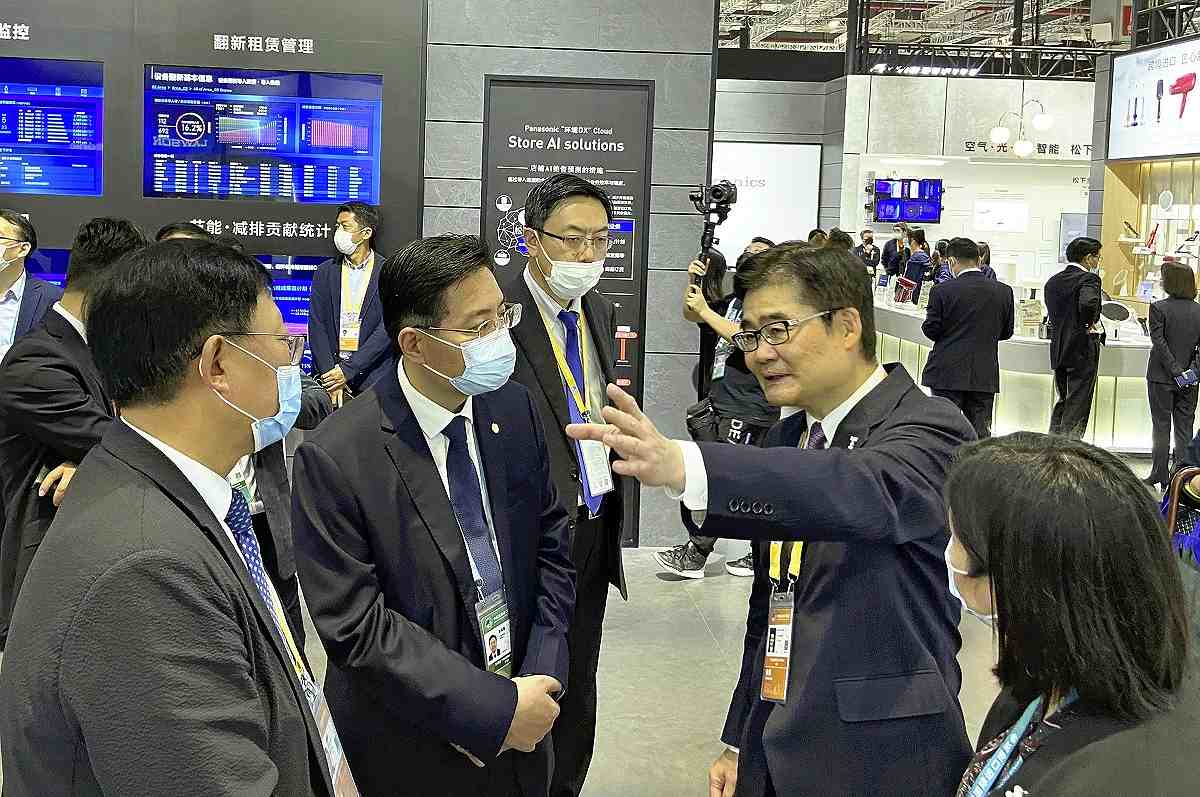
Panasonic Holdings Corp. Vice President Tetsuro Honma, second from right, speaks with local government officials at the China International Import Expo in Shanghai in November 2021.
16:18 JST, November 18, 2023
An increasing number of Japanese companies have shown interest in entering the Chinese market, although they remain wary because of the stagnant economy and the country’s harsh anti-espionage law, which greatly expands the scope of what China considers espionage.
With the Chinese economy remaining sluggish due to the real estate market crisis and other factors, China has made the attracting of foreign investment a main component of its economic policy.
Japanese investment in China currently ranks fifth among all countries or regions at 2.4% of total foreign investment. If investments through Hong Kong are included, the percentage can be seen to be significantly higher.
This spring saw the resumption of intergovernmental dialogue, economic activities and travel between the two countries. A source close to the Economy, Trade and Industry Ministry estimates that “more than 100 local governments have made visits to Japan to attract investment.”
Japanese companies continue to keep a watchful eye on the world’s second largest market.
Panasonic Holdings Corp. President Yuki Kusumi said in early November that the company intends to expand investment in China, saying, “China will always be one of the most important areas for us.”
A delegation from the Japan-China Economic Association, a group of Japanese business leaders, is expected to visit Beijing for the first time in 4½ years this coming January, looking to discuss the further strengthening of relations with Chinese government leaders.
Should the number of Chinese visitors to Japan return to pre-pandemic levels — which peaked at 9.59 million annually — economic benefits from brisk spending can be expected as well.
But it is unlikely that China will return any time soon to the high economic growth rates that it enjoyed in the 2000s, when they exceeded 10%. Investments by Japanese companies in China over the first half of this year totaled only $4.1 billion (about ¥620 billion), the slowest pace since 2010.
“Spending in China has been stagnant, and the supply and demand environment in Asia is deteriorating as a whole,” said Hajime Nakajima, senior managing executive officer at Mitsui Chemicals Inc.
Under the cloak of economic security, an “exit China” movement has been steadily progressing. The number of Japanese companies operating in China totaled 12,706 as of June last year, a decline of more than 10% over 10 years.
In October, a Japanese employee of Astellas Pharma Inc. was arrested on suspicion of violating the anti-espionage law, causing deep concern among Japanese business travelers to China and Japanese employees based in China.
Lu Kejian, a former Chinese minister to Japan, said that the Chinese government’s stance is that companies that operate legitimately will not be subject to the anti-espionage law.
But Prime Minister Fumio Kishida told Chinese President Xi Jinping at their summit meeting in San Francisco on Thursday that Japan wants to promote the revitalization of China-Japan economic exchanges, only after an environment that protects legitimate business activities is assured.
Top Articles in Business
-

Prudential Life Insurance Plans to Fully Compensate for Damages Caused by Fraudulent Actions Without Waiting for Third-Party Committee Review
-

Narita Airport, Startup in Japan Demonstrate Machine to Compress Clothes for Tourists to Prevent People from Abandoning Suitcases
-

Japan, U.S. Name 3 Inaugural Investment Projects; Reached Agreement After Considerable Difficulty
-

Toyota Motor Group Firm to Sell Clean Energy Greenhouses for Strawberries
-

SoftBank Launches AI Service for Call Centers That Converts Harsh Customer Voices into Softer Voices
JN ACCESS RANKING
-

Japan PM Takaichi’s Cabinet Resigns en Masse
-

Japan Institute to Use Domestic Commercial Optical Lattice Clock to Set Japan Standard Time
-

Israeli Ambassador to Japan Speaks about Japan’s Role in the Reconstruction of Gaza
-

Man Infected with Measles Reportedly Dined at Restaurant in Tokyo Station
-

Videos Plagiarized, Reposted with False Subtitles Claiming ‘Ryukyu Belongs to China’; Anti-China False Information Also Posted in Japan




















